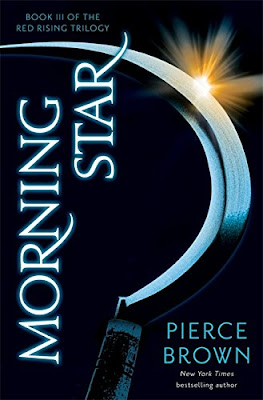I rise into darkness, away from the garden they watered with the blood of my friends. The Golden man who killed my wife lies dead beside me on the cold metal deck, life snuffed out by his own son’s hand.
Autumn wind whips my hair. The ship rumbles beneath. In the distance, friction flames shred the night with brilliant orange. The Telemanuses descending from orbit to rescue me. Better that they do not. Better to let the darkness have me and allow the vultures to squabble over my paralyzed body.
My enemy’s voices echo behind me. Towering demons with the faces of angels. The smallest of them bends. Stroking my head as he looks down at his dead father.
“This is always how the story would end,” he says to me. “Not with your screams. Not with your rage. But with your silence.”
***
Pierce Brown has several times cited Star Wars—specifically the original trilogy—as a influence of no small significance on the fan-favourite series Morning Star completes, and it's fair to say the pair share a double helix here and a structural strand there.
Like A New Hope before it, Red Rising introduced an almost recognisable galaxy ruled by an evil empire; an evil empire whose merciless machinations gave the saga's protagonist—here, the Helldiver Darrow—a very personal reason to rebel against said. It was a bloody good book, to be sure, but as nothing next to Golden Son, which scaled up the conflict and the cast of characters introduced in Red Rising marvelously, in much the same way The Empire Strikes Back improved in every conceivable sense on its predecessor. It also ended with a catastrophic cliffhanger... which we'll get back to.
In short, it shouldn't be such a surprise that the pattern which held true in books one and two of Brown's breakthrough also applies to the conclusion. For better or for worse, Morning Star is this trilogy's Return of the Jedi—though there are, thankfully, no Ewok equivalents in evidence.
The end begins with Darrow locked in a box.
Time, to wit, has lost all meaning to the Reaper, but he's been in this almost-but-not-quite-carbonite contraption for nearly a year. In the process the young man who freed Mars has lost much of his mind, and all of the carefully-carved body that helped him pass for a Gold in the colour-coordinated caste hierarchy of the sinister Society. He's so far gone, in fact, that he's seriously considering killing himself when a duo of deeply-embedded rebels finally spring him from the Jackal's base of operations.
Darrow may be back in play from this point on, but Brown is smart not to simply dismiss Golden Son's devastating denouement. The Reaper, returned, is no longer a leader. He has to be carved all over again, and retrained as if here were a new recruit to the cause. "Like a prisoner who spend his whole life digging through the wall, only to break through and find he's dug into another cell," (p.70) he feels beaten, defeated—which is understandable, because he was.
Like A New Hope before it, Red Rising introduced an almost recognisable galaxy ruled by an evil empire; an evil empire whose merciless machinations gave the saga's protagonist—here, the Helldiver Darrow—a very personal reason to rebel against said. It was a bloody good book, to be sure, but as nothing next to Golden Son, which scaled up the conflict and the cast of characters introduced in Red Rising marvelously, in much the same way The Empire Strikes Back improved in every conceivable sense on its predecessor. It also ended with a catastrophic cliffhanger... which we'll get back to.
In short, it shouldn't be such a surprise that the pattern which held true in books one and two of Brown's breakthrough also applies to the conclusion. For better or for worse, Morning Star is this trilogy's Return of the Jedi—though there are, thankfully, no Ewok equivalents in evidence.
The end begins with Darrow locked in a box.
Time, to wit, has lost all meaning to the Reaper, but he's been in this almost-but-not-quite-carbonite contraption for nearly a year. In the process the young man who freed Mars has lost much of his mind, and all of the carefully-carved body that helped him pass for a Gold in the colour-coordinated caste hierarchy of the sinister Society. He's so far gone, in fact, that he's seriously considering killing himself when a duo of deeply-embedded rebels finally spring him from the Jackal's base of operations.
Darrow may be back in play from this point on, but Brown is smart not to simply dismiss Golden Son's devastating denouement. The Reaper, returned, is no longer a leader. He has to be carved all over again, and retrained as if here were a new recruit to the cause. "Like a prisoner who spend his whole life digging through the wall, only to break through and find he's dug into another cell," (p.70) he feels beaten, defeated—which is understandable, because he was.



